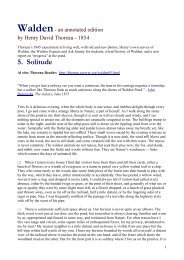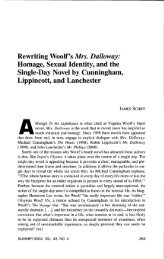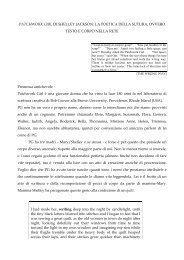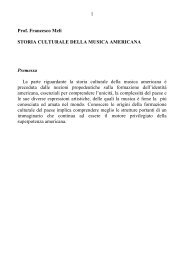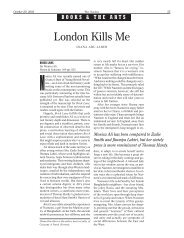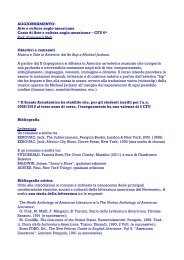Exciting Tales of Exotic Dark India - Paola Carbone
Exciting Tales of Exotic Dark India - Paola Carbone
Exciting Tales of Exotic Dark India - Paola Carbone
You also want an ePaper? Increase the reach of your titles
YUMPU automatically turns print PDFs into web optimized ePapers that Google loves.
284 Journal <strong>of</strong> Commonwealth Literature<br />
“free radios to people who are so keen on popular music”. 39 Balram’s<br />
life-story and The White Tiger’s dissection <strong>of</strong> <strong>India</strong>’s economic success<br />
might well be construed as a follow-up to Rushdie’s story’s depiction <strong>of</strong><br />
the period <strong>of</strong> the Emergency.<br />
“Authenticity” and “Real <strong>India</strong>”<br />
Writing my book [Midnight’s Children] in North London, looking out<br />
through my window on to a city scene totally unlike the ones I was<br />
imagining on to paper, I was constantly plagued by this problem, until I<br />
felt obliged to face it in the text, to make clear that [...] what I was actually<br />
doing was a novel <strong>of</strong> memory and about memory, so that my <strong>India</strong> was<br />
just that: “my” <strong>India</strong>, a version and no more than one version <strong>of</strong> all the<br />
hundreds <strong>of</strong> millions <strong>of</strong> possible versions.<br />
Salman Rushdie 40<br />
Rushdie celebrates the idea <strong>of</strong> “hybridized, mongrel truth”, and contends<br />
that “we should avoid at all cost any pedigreed version <strong>of</strong> the truth”. 41<br />
Even though the reaction <strong>of</strong> <strong>India</strong>n readers both in the subcontinent and<br />
in the diaspora to The White Tiger was multifarious, neither wholly hostile<br />
nor adverse, Adiga still faced the recurrent accusation <strong>of</strong> complicity with<br />
re-Orientalist – and hence “inauthentic” – representations <strong>of</strong> <strong>India</strong>. In<br />
this respect, Kanchan Gupta claims that he:<br />
crafted his novel in a manner that it could not but impress the Man<br />
Booker judges who see <strong>India</strong> as a seething mass <strong>of</strong> unwashed hordes<br />
which worship pagan gods, are trapped in caste-based prejudices, indulge<br />
in abominable practices like untouchability, and are not worthy <strong>of</strong> being<br />
considered as an emerging power, never mind economic growth and<br />
knowledge excellence. 42<br />
Against those such as Gupta who posit that “authentic” representations<br />
depend upon finding a space exterior to western market forces, this article<br />
maintains that a “hybridized, mongrel truth” is enabled in The White Tiger<br />
by playing the rules <strong>of</strong> the global literary marketplace, rather than by<br />
escaping from it. Ultimately, both the protagonist <strong>of</strong> Adiga’s novel and<br />
the “truth” he tells about Rising <strong>India</strong> play out a “hybridized, mongrel<br />
truth”. Furthermore, Balram and his “reality” are strategically inauthentic:<br />
through intentional self-contradiction and ironic character development,<br />
Adiga’s failure to achieve (an in itself untenable) authenticity is deliberate.<br />
In Huggan’s formulation, authenticity stands as the “currency at play in<br />
the market place <strong>of</strong> cultural difference”. 43 The White Tiger takes Huggan’s<br />
terms one step further by blatantly choosing to stage “inauthenticity”<br />
while simultaneously holding up for critical scrutiny the novel’s own<br />
complicity with the marketing <strong>of</strong> an <strong>Exotic</strong> <strong>India</strong>. Departing from what<br />
Downloaded from jcl.sagepub.com at Senate House Library, University <strong>of</strong> London on November 29, 2010



